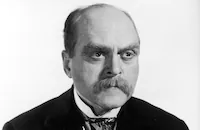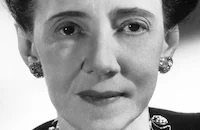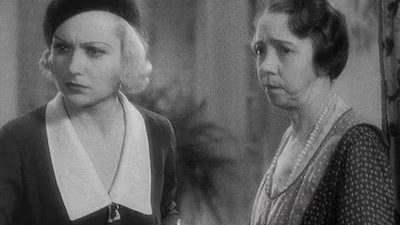No Man of Her Own

Brief Synopsis
Cast & Crew
Wesley Ruggles
Clark Gable
Carole Lombard
Dorothy Mackaill
Grant Mitchell
Elizabeth Patterson
Film Details
Technical Specs

Synopsis
Crooked gambler Babe Stewart leaves Manhattan for the small town of Glendale when his ex-mistress, Kay Everly, threatens to expose him. There he tries to seduce librarian Connie Randall, who refuses him until he flips a coin and agrees to marry her. Back in New York, Babe loses at cards to his partners Vane and Vargas in order to evade Detective Collins, a friend of Babe's most recent victim. Unsuspecting, Connie wakes Babe for work each morning and he is forced to spend his days on Wall Street. His subterfuge works until Connie discovers his marked deck and shuffles the cards before an important game, causing Babe to lose. Angry at Connie's meddling, Babe plans a trip to Rio de Janeiro for some big money and sends Connie back to Glendale. Realizing his love for her, however, he gives himself up to Collins for a ninety-day jail sentence. When Connie returns to New York, pregnant, for Babe's homecoming from Rio, she learns the truth, and the couple embraces.

Director

Wesley Ruggles
Cast

Clark Gable

Carole Lombard

Dorothy Mackaill

Grant Mitchell

Elizabeth Patterson

George Barbier

J. Farrell Macdonald
Tommy Conlon

Walter Walker
Paul Ellis
Lillian Harmer
Frank Mcglynn
Crew

Photo Collections
Videos
Movie Clip



Film Details
Technical Specs

Articles
No Man Of Her Own - No Man of Her Own (1932)
One of the reasons Gable and Lombard didn't appear together again after No Man of Her Own is that both were stars at their respective studios, he at MGM, she at Paramount, and their popularity made executives reluctant to lend them out. It was only by chance that they were teamed up for this 1932 movie. At the time, William Randolph Hearst and Marion Davies's production company was still connected to MGM, and Davies wanted Paramount contractee Bing Crosby for her next picture, Going Hollywood (1933). To please his mistress, the ever-devoted Hearst talked Louis B. Mayer into trading Gable's services for Crosby's. Convinced No Man of Her Own was of little importance and Paramount wouldn't be able to profit from the loan of his fast-rising male star, Mayer let Gable go...and was sorry when the movie turned out to be a hit.
Originally No Man of Her Own was slated for George Raft, but the role fit Gable to a tee, and Paramount jumped at the chance to capitalize on the successful image he had built at MGM. His co-star was to be Miriam Hopkins, who soon begged off the picture (one of the rumored reasons was because she did not want to be billed below Gable as MGM demanded in the loan-out deal). Director Wesley Ruggles, an old friend of Gable's, wanted Lombard, but the studio didn't think she was a big enough star; that would come later, with her breakthrough comic performance in Howard Hawks's Twentieth Century, 1934. Ruggles and Lombard connived, however, and she was soon in front of the camera with the man she would one day marry.
The two got along well; Lombard even presented him with her trademark prank gift at the wrap party, a ham with Gable's picture on it. But each was married to someone else at the time, Lombard to actor William Powell and Gable to socialite Rhea Langham, seventeen years his senior. It would be four years before romantic sparks began to fly. They were married in 1939 and were by most accounts one of Hollywood's happiest couples until her death in a plane crash in 1942 at the age of 33.
According to published reports at the time, the title was borrowed from the best-selling novel No Bed of Her Own by Val Lewton, who later helmed the legendary RKO horror unit in the 1940s. The book's title was also used as the film's working title in the early stages of production. As the title would suggest, the script initially ran into some censorship problems, resulting in a memo found in the Paramount files defending the story as "essentially a brutal one a sock on the nose and we are going to sacrifice its best values if we try to soften it, make it nice, or whitewash it."
Gable was a bit player in three other Ruggles silents, and the two worked together one more time in Somewhere I'll Find You (1942). Ruggles directed Lombard twice more after this: Bolero (1934) and True Confession (1937). An Oscar® nominee for the big budget Western Cimarron (1931), Ruggles was better known for sparkling romantic comedies, among them The Bride Comes Home (1935) with Claudette Colbert and Fred MacMurray, Too Many Husbands (1940) with MacMurray and Jean Arthur, and Slightly Dangerous (1943) with Lana Turner and Robert Young. He also directed the racy Mae West comedy I'm No Angel (1933), one of the movies that supposedly ushered in a much stricter Production Code.
No Man of Her Own is not to be confused with another movie of the same name made in 1950, a mystery melodrama starring Barbara Stanwyck with a completely different storyline.
Producer: Albert Lewis
Director: Wesley Ruggles
Screenplay: Milton Herbert Gropper, Maurine Dallas Watkins; Benjamin Glazer, Edmund Goulding (both story)
Cinematography: Leo Tover
Music: W. Franke Harling (uncredited)
Cast: Clark Gable (Babe Stewart), Carole Lombard (Connie Randall), Dorothy Mackaill (Kay Everly), Grant Mitchell (Vane), George Barbier (Mr. Randall), Elizabeth Patterson (Mrs. Randall), J. Farrell MacDonald ('Dickie' Collins), Tommy Conlon (Willie Randall), Walter Walker (Mr. Morton), Paul Ellis (Vargas), Lillian Harmer (Mattie).
BW-85m.
by Rob Nixon

No Man Of Her Own - No Man of Her Own (1932)
No Man of Her Own (1932) - Carole Lombard & Clark Gable in NO MAN OF HER OWN on DVD
In the film, Gable plays a con man with a smooth system of bilking unsuspecting suckers of their dough via fixed card games with his con artist friends. He's also strictly a love-'em-and-leave-'em kind of guy, much to girlfriend Dorothy Mackaill's dismay. When a suspicious cop turns up the heat, Gable decides to hide out in a small town until things cool off. There he discovers Carole Lombard as the town librarian, bored to death and yearning for adventure. ("Oh boy, is she a handful," a magazine vendor says of her.) Their flirtatious banter in the library is the movie's high point of sexy romantic comedy. Everything clicks in this scene, most of all the two stars' chemistry. Lombard suggests a book by Shakespeare, and Gable responds, "Some nights you just don't FEEL like Shakespeare..." When he asks her to climb a ladder to get a book for him, and he takes the opportunity to look up her skirt, we know we're in serious pre-Code territory. The whole movie is worth watching for this hilarious sequence.
Before we know it, Gable has taken Lombard as his bride back to Manhattan, where he tries to keep private his shady way of making a living. (His apartment's fantastic fold-out bar must also be mentioned!) At the one-hour mark, the movie definitely loses some steam as it turns into more of a drama, but Lombard's heartfelt performance does much to maintain our interest. Unfortunately, the movie does suffer from an unsatisfying final fadeout.
Still, the majority of No Man of Her Own is a delightful, sexy, funny romp that should please fans. Pre-Code chances to show the stars in their underwear are not wasted (in Lombard's case she's also wearing high heels), and one sequence in a church creates fine comedy entirely from a series of glances - most impressive.
Gable and Lombard are so good together that it is truly a shame they were never paired on screen again. The future lovebirds were each married at the time they made this and by all accounts did not engage in any hanky-panky on the set. By the end of the decade, of course, they'd be married to each other. It's undoubtedly just the magic of the movies, but it seems plain why they ended up together when, in this film, Gable says to Lombard, "That twinkle in your eye. Wrap it up for me, will you?"
Universal's DVD has a few light scratches now and again, but nothing too bad. Sound is fine.
For more information about No Man of Her Own, visit Universal Home Entertainment. To order No Man of Her Own, go to TCM Shopping.
by Jeremy Arnold
No Man of Her Own (1932) - Carole Lombard & Clark Gable in NO MAN OF HER OWN on DVD
Quotes
You'd be lovely to have around, just to sprinkle the flowers with your personality.- Connie
Trivia
In the first five minutes of the movie, Clark Gable takes a taxi. You get a very clear view of the front hood of the cab, with the telephone number of the cab company. One hour into the movie, the Clark Gable character calls his wife with his new office phone number. He looks at the dial of his new phone, and gives her the telephone number of the cab company.
After filming was over 'Carole Lombard' presented Clark Gable with a ham featuring his picture on it.
Although Lombard and Gable later became one of Hollywood's most famous couples, they were completely indifferent to one another during the making of this film. It was not until several years later that they met again and fell in love.
Notes
According to contemporary sources, this film's title was borrowed from Val Lewton's best-selling novel No Bed of Her Own, originally purchased for Clark Gable and Miriam Hopkins. The novel's title was also used as an early working title. According to the file on the film in the Paramount Script Collection at the AMPAS Library, Austin Parker wrote the original treatment and screenplay from Lewton's novel. To satisfy censorship restrictions imposed by the Hays Office, another story titled "Here Is My Heart" (not to be confused with the 1934 Paramount film starring Bing Crosby) was purchased August 6, 1932. A treatment note found in the story files states, "the story is essentially a brutal one-a sock on the nose-and we are going to sacrifice its best values if we try to soften it, make it nice, or whitewash it." The first script dated September 17, 1932 lists James Flood as director and E. Lloyd Sheldon as associate producer. Although Wesley Ruggles eventually replaced Flood, it is unclear whether Sheldon remained on the production as associate producer, although the story files list Albert Lewis as the film's final producer. On September 23, 1932, Hollywood Reporter announced that the script was being rewritten. According to a Hollywood Reporter news item on October 4, 1932, Lowell Sherman walked off the set after a pay dispute and was replaced by Wesley Ruggles. Hopkins quit the production in early November 1932, claiming the role was not suitable for her. Gable was on loan from M-G-M for this film. Gable and Lombard were married in 1939. This was their only co-starring film. According to a Hollywood Reporter news item, this film was re-issued in 1937.














